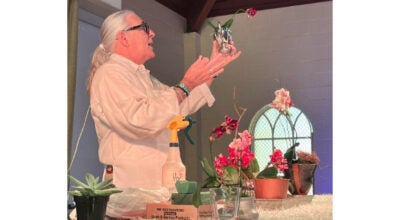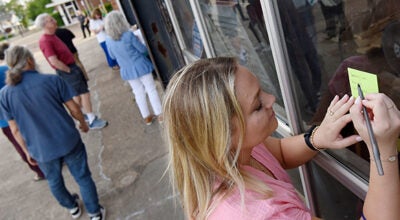Program offers therapy for adults with disabilities
Published 12:07 am Sunday, June 15, 2014

BEN HILLYER/The Natchez Democrat — Brandi’s Hope Day Program Supervisor Candace Jordan presses her ears to Latorria Wheeler’s headphones to help Wheeler listen to music from one of the computer station’s in the residential therapy program’s computer room.
NATCHEZ — When a man sticks his head into the office occupied by Candace Jordan and Emily Stevens and asks if they want coffee, the question is about more than just a cup of joe.
As he leaves, Jordan says, “Coffee’s his thing. Everybody here has their thing, and coffee’s his.”
The man is a client of Brandi’s Hope, a residential therapy program that provides domestic and employment training for people with intellectual or physical disabilities.
Something as simple as making coffee can be a part of that training, Jordan said.

One of Benny Buckles’ favorite places to be at Brandi’s Hope is the swing in front of the house on Linden Drive.
“Our goal is to train and mentor these individuals to be as independent as they can,” she said. “They want choices, they want to be happy, so our goal is for them to be independent members of the community.”
Named for Brandi Erin Cowart, who was born with a chromosomal disorder, Brandi’s Hope was founded by Cowart’s parents in 2010 after they saw a need for support services for people with developmental disabilities who wanted a choice in how they lived. Natchez is the seventh location for Brandi’s Hope in Mississippi.
The training focus of Brandi’s Hope in Natchez is a multi-pronged, cross curriculum home economics program.
One of the ways the clients are trained to make money is by selling casseroles to the community at large. Information about the casserole program has largely spread by word-of-mouth as clients have interacted with people around town, Jordan said.
The participants are expected to choose their recipe, go to the store and purchase the necessary ingredients, prepare the casseroles and take the finished product to the person who ordered them, Stevens said.
“They prepare everything — they shred the chicken, shred the cheese and deliver to people in the community,” she said. “This way, they are working on their domestic skills, on their community skills and on their entrepreneurial skills.”
Other times, the clients are taken to do things like get manicures and pedicures, or go bowling or to the library, so they can experience those things and get a chance to interact with people in the community in other contexts, Jordan said.
Brandi’s Hope also provides job coaches to help clients prepare a résumé, apply for a job and learn the skills necessary to stay on task when they get a job, Jordan said.
Part of that includes managing money, and the staff also teaches the clients how to check their bank balances online and plan for future spending and saving.
But the services and training don’t stop at the end of the workday.
Brandi’s Hope has five residential houses — four are occupied at the moment — that allow various amounts of freedom for the clients.
At one house, a Brandi’s Hope employee is there during the day, but the clients spend the night alone, Stevens said. The doors and windows have electronic sensors that will alert staff members if they have been opened, as do some valves in the house — for example, the water.
Another house has full-time staff.
But the difference residential living in a home setting as opposed to an institution can make is amazing, Stevens said.
“In one house, they have almost as much independence as almost everybody else, they just have somebody there to drive them,” she said.
“When they get there, at first they want to be in the kitchen all the time because they never had the freedom. They’ll want to be in their bedroom because they have never had the ability to close the door. There will even be a difference in how someone brushes their teeth in just a week.”
Because Brandi’s Hope is a for-profit business, the staff can’t raise funds, but the community at large can help by finding ways for the clients to be better integrated, Stevens said.
“We want to be involved,” she said. “They love to work. They hate to sit around and do nothing.
“So many people write our individuals off and think they can’t do anything, but give them some time and they will show you want they can do.”
Jordan has worked in similar programs for a number of years, she said, but as a parent of one of the clients — her daughter Angel has cerebal palsy — she sees the value in not only helping clients get out but the community interact with them as well.
“People with challenges, we often brush aside and say, ‘Oh, that poor person,’ but they are a person,” Jordan said. “When you have a child, you want people to learn and understand rather than stare and whisper. It is up to us to learn about these differences, to appreciate these differences.”
Brandi’s Hope can be reached at 601-392-0395.





